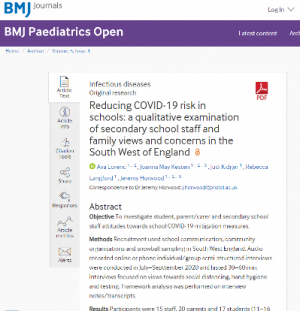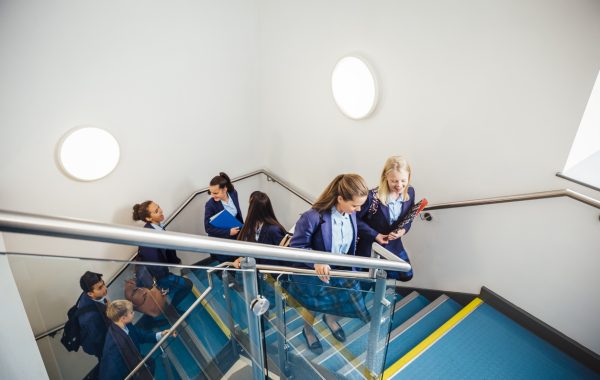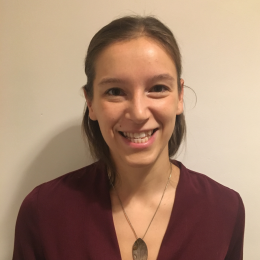Back to School: What young people, parents, carers and teachers think about COVID-19 measures in secondary schools
The first wave of the COVID-19 pandemic led the UK Government to introduce lockdown measures that changed the way education was delivered. Most young people had to learn from home, with schools only remaining physically open for vulnerable pupils and children of key workers.
When lockdown measures eased, secondary schools invited some pupils to return to school part-time, while others continued to learn at home. Local councils and schools re-opened schools fully in September 2020, until January 2021.
Schools re-opening posed a challenge because of the difficulties to maintain social distancing to prevent the spread of COVID-19. These challenges had to be balanced against the benefits for young people of returning to school, such as resuming their education and seeing their friends. To stop the spread of the virus, schools put in place a range of measures including hand-washing campaigns, staggered break times and test and trace schemes.
The Back to School study examined how young people, parents and teachers in Bristol felt about returning to secondary school, to understand how the government and schools could give them the best support.
This project was conducted in collaboration with the NIHR Health Protection Research Unit in Behavioural Science and Evaluation at the University of Bristol and Bristol City Council.
What we did
We interviewed:
- 13 school staff, including heads, assistant heads, teachers and Special Educational Needs Coordinators
- 20 parents
- 17 students aged 11-16
They were from 14 diverse secondary schools in Bristol. We wanted to understand their views on:
- the re-opening of secondary schools in September 2020
- school Covid-19 infection control measures, such as social distancing and hand hygiene
- a school test-and-trace study (CoMMinS) using saliva samples to test young people and school staff for COVID-19
How we involved people
To help us design the study, we ran an online session with school staff to get their feedback on the study’s processes and documentation and the most appropriate academic year groups to recruit. We also had feedback from members of the ARC West Young People’s Advisory Group.
What we found and what this means
Concerns about COVID-19 risk at school were outweighed by the potential impacts of missing learning. Interviewees described a wide variety of school COVID-19 measures being planned. Each school had to develop their own plans because of unclear government guidance. Participants generally saw infection control measures as an acceptable and pragmatic solution to the apparent impossibility of social distancing in crowded schools. Some staff felt guilt around being a potential “COVID-19 spreader” by teaching multiple classes.
Staff were also concerned about the negative impact of COVID-19 measures on students. This included concerns about behaviour, learning, and providing emotional support, particularly for those with Special Educational Needs or mental health issues who might find the measures especially challenging. The measures could make inequalities worse for these students:
“disadvantaged students, and students that would normally get more support in a lesson – because it’s more like lecture style now, so we’re not really allowed to walk between the desks or anything – those students are going to miss out.” (Teacher)
Our study suggests that clear, consistent information promoting a sense of collective responsibility could help students follow the measures. This includes emphasising the social good, benefits to students’ families or the wider community, and a sense of collective identity and responsibility:
“I think empowering people to be autonomous and realise that their efforts are for the collective good. That they’ve all got a part to play in it. I think that’s much better than publicly shaming them, or criticising them…if you want to achieve compliance and cooperation, it’s creating an atmosphere that it’s in everyone’s best interest and you contribute to the common good.” (Teacher)
Participants welcomed COVID-19 testing in schools, to reassure staff, students and parents about school safety, encourage attendance and potentially reduce the need for school closures. A small number of concerns were raised relating to:
- data security and anonymity around getting a positive COVID-19 test
- more school closures from positive test results
- practical aspects of testing (time, space and administration)
These findings have important implications for policymakers and schools. Clear, consistent information is needed from both governments and schools, to create a sense of collective responsibility and prevent stigma related to COVID-19 infection.
Tailored support for vulnerable students and those with additional needs must be considered. Schools and policymakers need to think about:
- potential unintended consequences of measures
- ways to support vulnerable individuals and those with additional needs
- how to avoid deepening inequalities
Additional funding to achieve this may be required.
Rapid reports
While research was on-going, the study team produced a series of rapid reports highlighting common thoughts and concerns. This meant findings could be fed back rapidly to education leaders regionally and nationally, as well as to the Department of Education, informing policies for re-opening of schools and support for students’ mental health and wellbeing.
This first interim report presents preliminary findings from interviews held with five school staff from three schools and eight families (seven young people, mostly Years 7/8 (11-13 years), and eight parents) from five schools, between 15 July and 7 August 2020. Read the interim report (PDF).
The final report presents preliminary findings from interviews with 13 school staff from seven schools and 20 families from eight schools, conducted between 15 July and 4 September 2020. Read the final report (PDF).
What next?
These findings have fed into the development of the COVID-19 mapping and mitigation in schools (CoMMinS) study. CoMMinS aims to understand how COVID-19 spreads in schools and is transmitted to family contacts. It also aims to work with schools to develop new knowledge and tools to help schools to manage the risk of infection while staying open. The research programme is led by Professor Caroline Relton and involves a large team of experts on infectious diseases, virologists, vaccine experts, laboratory scientists, data analysts, engineers and health psychologists.
ARC West researchers Sabi Redwood and Jeremy Horwood are leading a sub-study of CoMMinS investigating the mental well-being of students and staff as a result of COVID-19 measures.
Paper

Reducing COVID-19 risk in schools: a qualitative examination of secondary school staff and family views and concerns in the South West of England
Read the paperRelated research
The Back to School project links with the CoMMinS study.
Links and downloads
- The final rapid report from the Back to School project Back to School final rapid report
- The first rapid report from the Back to School project Back to school first rapid report
Lead collaborators
- Dr Judi Kidger – Lecturer in Public Health, Bristol Medical School, Bristol Population Health Science Institute, University of Bristol
- Dr Christina Gray, Director of Public Health, Bristol City Council
- Dr Beki Langford, Research Fellow, Bristol Medical School, University of Bristol
- Jo Williams, Consultant in Child Public Health, Bristol City Council
ARC West Staff
Dr Joanna Kesten
Senior Research Fellow, Qualitative ResearchPartners on this project
Bristol City Council
The council plays a vital role in the health community as public health is part of its remit. Its role is to prevent disease, promote health, and prolong life among the population of Bristol. Its activities aim to provide conditions in which people can be healthy and it focuses on the population as a whole, not on individual patients or diseases.
University of Bristol
The University of Bristol is internationally renowned and one of the very best in the UK, due to its outstanding teaching and research, its superb facilities and highly talented students and staff. Its students thrive in a rich academic environment which is informed by world-leading research. It hosts the Elizabeth Blackwell Institute for Health Research.

